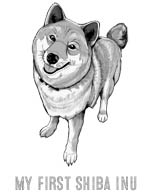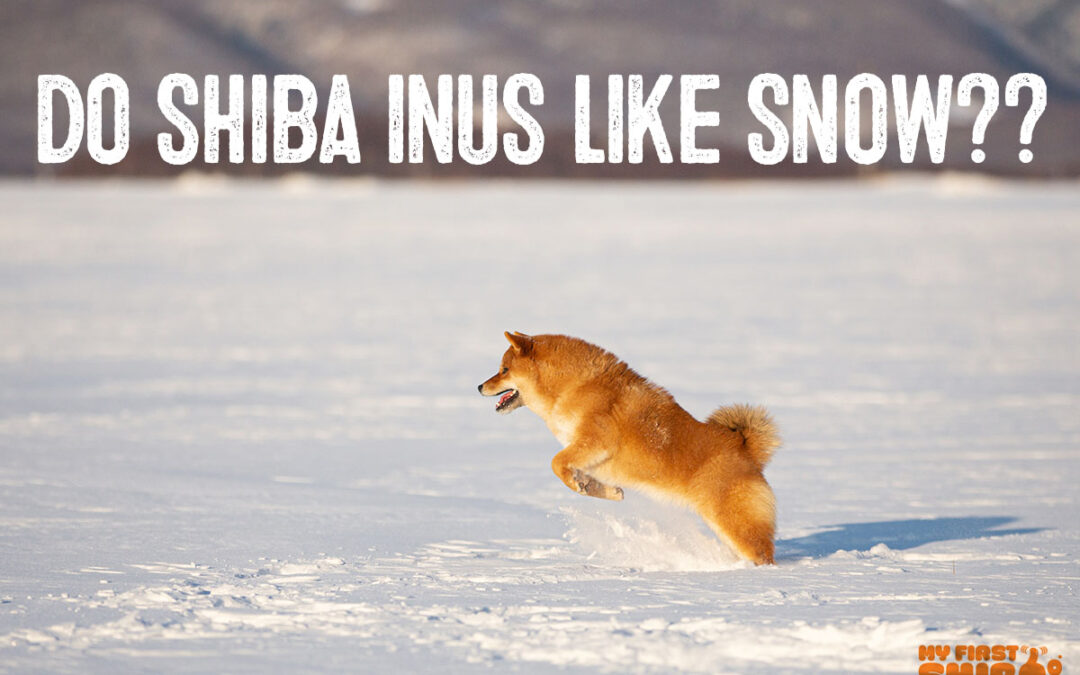On occasion, our posts contain affiliate links. However, we only recommend products that we truly believe in. For more information, visit my privacy policy page.
Phew, this website is a labor of love and largely a one-woman show so unless indicated, all articles written by J.Tsukamoto
For many of us (not me - I live in Hawaii), winter is a magical time for those that enjoy snow and all the fun things you can do in snow.
Whereas others might find winter a bit too bitter for their tastes.
But what about our Shibas?
Do they enjoy snow? Can they even comfortably tolerate snow?
Although every Shiba Inu has their individual likes and dislikes - most Shiba Inus enjoy frolicking in the snow to varying degrees.
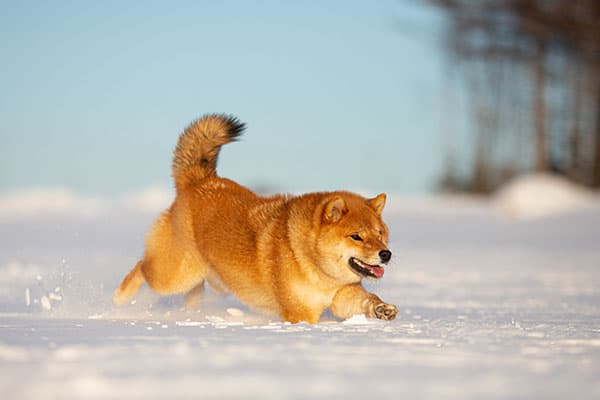
This is no surprise being that Shiba Inus originated in the frigid, mountainous regions of Japan - hence their insulated and protective double coat.
Plus all dogs love to experience new sensory environments that stimulate their interest and senses! Remember when you were a kid and first experienced snow, or warm ocean waves?
It was most likely terrific right?
Read on to learn how to ensure how your Shiba can have safe and pleasant experiences in snowy conditions.
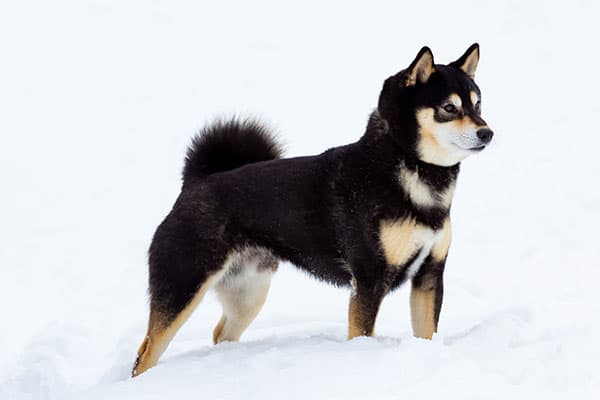
The Shiba Inu’s Origins and Adaptations
Shiba Inus are an ancient basal breed, tracing their origins back to 300 B.C.
The Japanese used and bred Shibas to be small game hunters in rugged, mountainous regions resulting in a compact, sturdy body equipped with a dense double coat.
This adaptation evolved to allow Shibas to tolerate cold weather efficiently and protected them from the icy and harsh temperatures.
Modern day Shiba Inus have retained this genetic feature which means their well-insulated double coats can allow them to retain their bodily warmth which allows the Shiba to use the saved energy for romping around in the snow if they see fit.
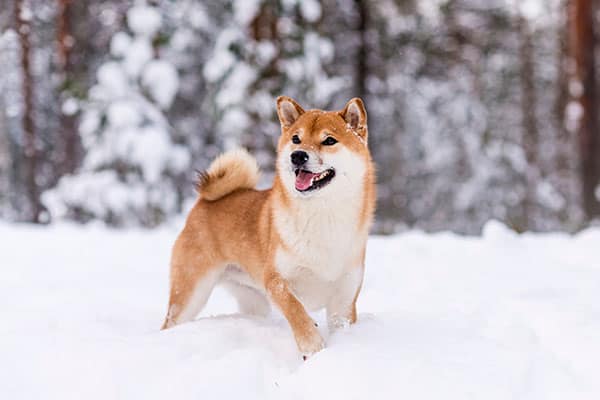
Why Most Shiba Inus (And Dogs) Love Snow!
Witnessing a Shiba gleefully bounding through fresh snowfall is such a joy! You can tell the Shiba is tickled pink with the experience.
But why?
The answer lies in a blend of biology, environmental novelty, and sensory pleasure that snow provides to dogs.
Dogs, like humans, are creatures that thive on sensory experiences.
Their world revolves around what they can smell, see, hear, and feel.
The sensory explosion that snow provides is akin to a sensory feast for dogs.
Each snowflake is unique, and the same goes for its scent.
The smell of snow is different from that of the usual grass or dirt, stimulating their acute sense of smell.
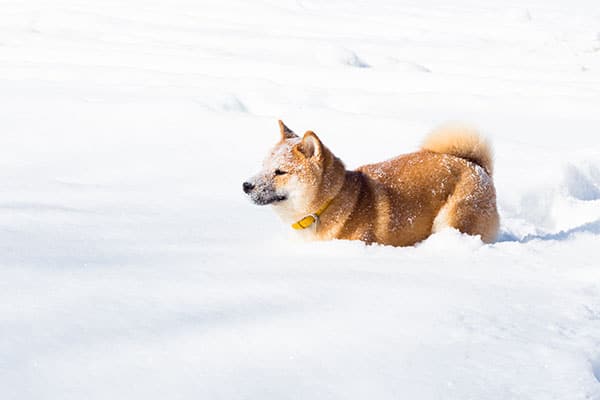
Our Shibas are likely mesmerized by the unique texture of snow under their paws and the invigorating chill it provides.
It's a novel experience and much different from the everyday textures they encounter.
A snow-filled environment also provides a different auditory experience for our dogs.
The world becomes quieter as sounds are muffled by the porous nature of snow.
At the same time our Shibas get to experience new sounds such as the sound of “crunchy” walking underfoot which is intriguing to them.
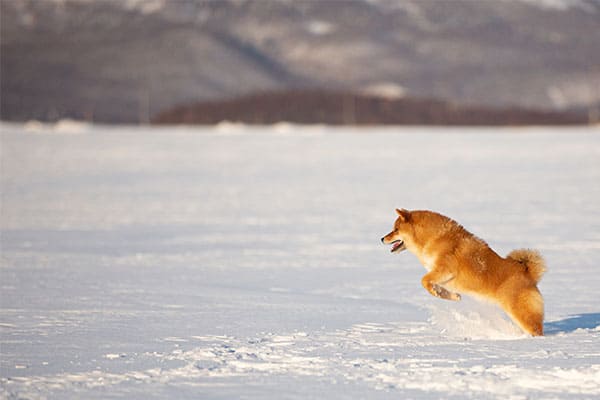
And finally, dogs love snow because many dogs absolutely love playing in snow!
Snow provides a totally new playground to romp around and explore - whether it’s digging through the fluffy layers, chasing snowflakes, or sliding on icy patches - these new activities are an exciting break from their regular routine.
The white landscape also makes seeing their toys easier and likely more enticing to fetch.
How Cold is Too Cold to Walk a Shiba?
All Shibas will have a different tolerance to the cold depending on their age, size, weight, coat color and health.
Most healthy adult Shiba Inus with a full double coat can comfortably handle walking in temperatures as low as 32F.
Due to their double coat, most Shibas can handle temperatures a bit lower but it’s up to you as an owner to determine what conditions are safe for your Shiba and how long they can be in the cold.
Other factors like wind chill, dampness, and cloud cover can affect your Shibas ability to tolerate the conditions. It’s important never to expose your Shiba to conditions that are not safe.
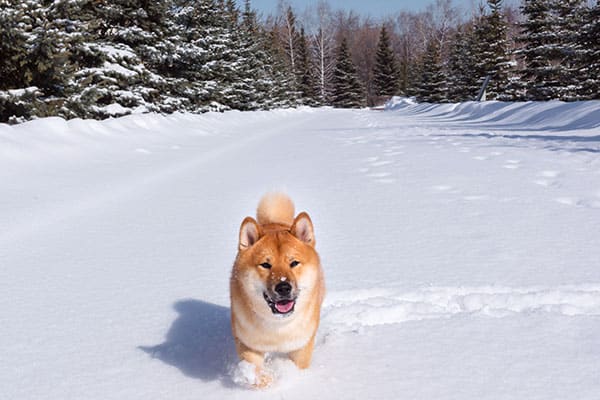
A study in the Journal of the American Veterinary Medical Association reported that the risk of cold-related conditions like frostbite and hypothermia increases significantly in wet and windy conditions (Drobatz & Smith, 2003).
Wet fur loses its insulating properties, making dogs susceptible to the cold, and wind can further exacerbate heat loss.
Active Shibas can tolerate cold temperatures better than slow, sedentary Shibas due to the extra body warmth they produce through activity.
If you notice your Shiba is anxious, shivering, slowing down, or whining - it’s time to get out of the cold and dry / warm up.
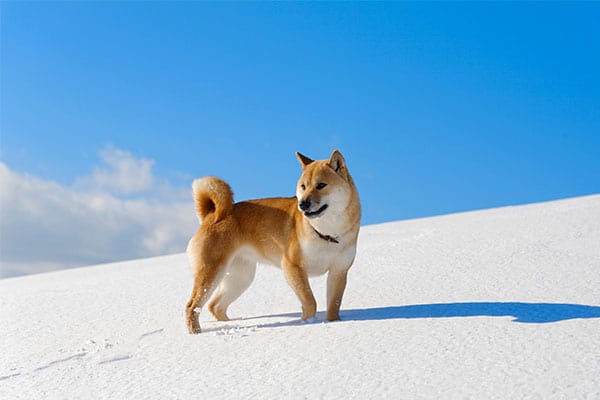
9 Tips For Keeping Your Shiba Safe in Snowy Conditions
- Monitor time in the cold: Always supervise your Shiba Inu while they're outside in the cold weather to ensure they're not showing any signs of discomfort or cold stress.
- Provide a warm shelter: If your Shiba spends a significant amount of time outside, it's important that they have a warm and comfortable shelter.
- Winter wardrobe: You should consider warm clothes such as dog coats for Shibas that are; older, younger, have health conditions, have thinner coats
- Paw protection: Snow, ice, and road salts can be harsh on your Shiba's paws. Dog booties can provide protection from these elements as well as provide additonal warmth for your Shiba. Also, remember to clean your Shiba's paws after walks to remove potential irritants.
- Avoid icy areas: Ice can be slippery and dangerous for dogs too. Avoid patches of ice to prevent slipping and possible injury.
- Check for snowballs: Shiba Inus have dense fur that can accumulate little "snowballs." When returning home, be sure to thoroughly dry your Shiba's coat
- Shortened walks: If conditions seem too harsh, it's best to keep walks short and brisk. To compensate, increase play time indoors or other protected areas.
- Know your Shiba's limits: Every Shiba Inu may respond differently to cold weather. Some may love the snow, while others may definitely hate it. Understand your Shiba's preferences and tolerance levels and adjust your care routine accordingly.
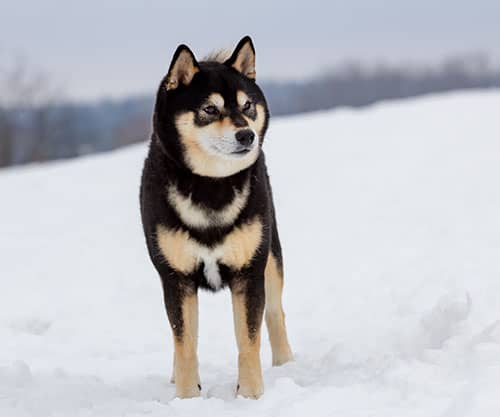
In Summary
In conclusion, it's probably safe to say that your Shiba Inu will likely enjoy the experience of snow, provided the conditions are not too rough.
And while it's rewarding to watch your Shiba's snow-induced excitement, it's also crucial to ensure their comfort and safety during the their time in the cold.
It's also important to understand that some Shibas may hate or be fearful of snow which means that adjustments to snowy conditions need to be considered.

Thanks for visiting Myfirstshiba.com! We do our very best in providing our readers with awesome content about our beloved Shiba Inu breed. Some of our articles include reviews and recommendations to our favorite products. We do occasionally earn commissions from certain affiliate links that help support our work and mission. Thanks again for visiting. Shiba Kisses To All!
